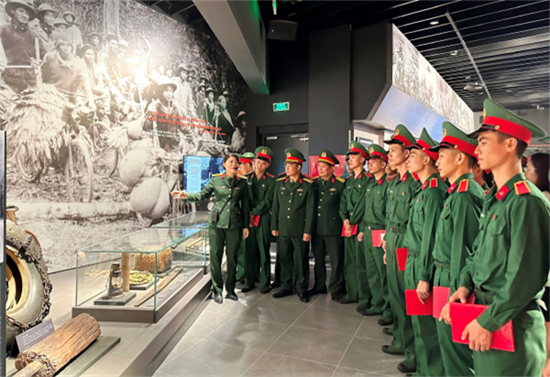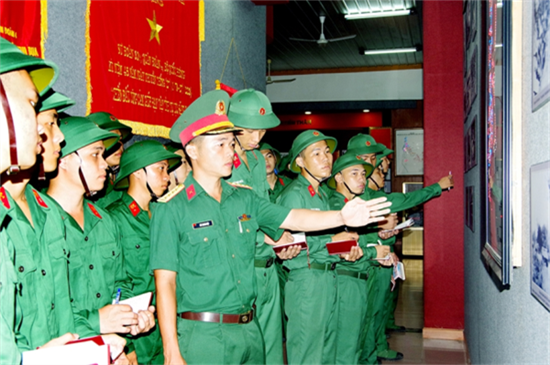Education in revolutionary traditions constitutes an important aspect of the Party’s ideological work and a vital component of Party and political work within the Army. It directly contributes to nurturing patriotism, national pride, revolutionary ideals, fighting morale, and the aspiration to dedicate oneself to the cause of the Fatherland among cadres and soldiers. At present, the work of traditional education faces a number of new issues that demand due attention from agencies and units. On that basis, appropriate and effective measures are required to further enhance the quality and impact of this essential undertaking.
Tradition embodies the cultural and spiritual values that have been formed and nurtured through thousands of years of the Vietnamese people’s struggle to build and safeguard the nation. Passed down from generation to generation, these values have become an enduring source of strength throughout the history of every nation and people.
President Ho Chi Minh once reminded us: “Our people must know our history, so that they truly understand the origins of our country, Việt Nam.” His profound teaching reflects a consistent viewpoint on the pivotal role of traditional education, regarding it as the foundation for awakening patriotism, national pride, and the will to rise in every Vietnamese citizen.
Throughout more than eighty years of building, fighting, triumph, and growth, the work of traditional education in our Army has always received great attention and played a vital role in enhancing awareness, strengthening faith, fostering national pride and dignity, and fortifying the fighting morale of officers and soldiers. It has contributed to nurturing the noble combat ideal: “For the independence and freedom of the Fatherland, for the happiness of the People”. From the very founding of the Vietnam Propaganda Liberation Army Team, the predecessor of today’s Vietnam People’s Army, on 22 December 1944, our Party and President Ho Chi Minh placed particular emphasis on cultivating patriotism, hatred of the enemy, and the indomitable spirit of the nation among officers and soldiers. Merely two days after its establishment, the team achieved resounding victories at Phai Khat and Na Ngan, inaugurating the glorious tradition of “Determined to fight, determined to win” of the heroic Vietnam People’s Army.
 |
| Cadets of the Logistical Academy visit the Military History Museum |
During the protracted wars of resistance against colonialism and imperialism, under the leadership of the Party, traditional education within the Army was conducted extensively, with flexible and creative content and methods. It helped to awaken in every cadre and soldier a profound sense of national pride, dauntless courage, and the steadfast belief that “Nothing is more precious than independence and freedom,” enabling them, together with the entire people, to achieve brilliant victories in the historic cause of national liberation and defence.
Building upon the achievements and experience accumulated over the years, the work of traditional education has continued to receive close attention and direction from the Central Military Commission, the Ministry of National Defence, the General Department of Political Affairs, and Party committees and commanders at all levels. It has been implemented in a comprehensive and effective manner. In particular, recent propaganda campaigns and commemorative activities marking major national and military anniversaries have generated a strong and widespread resonance throughout the entire Army and the people. These activities have not only deepened officers’ and soldiers’ understanding, emotions, and sense of responsibility in preserving and promoting the glorious traditions of the nation, the Party, the Army, and their units, but have also strengthened the flesh-and-blood bond between the Army and the people, thereby contributing to safeguarding the Party’s ideological stronghold in the new situation.
Entering a new stage of national and military development, amid profound and multidimensional impacts from both objective circumstances and internal requirements, the work of traditional education now faces several emerging issues that call for serious attention. Agencies and units must approach them with a thorough understanding and adopt appropriate measures to improve the quality and effectiveness of traditional education, particularly at the grassroots level.
Through research, we have identified several key issues that merit further discussion as follows:
First, on awareness and leadership. At present, in some grassroots units, the work of traditional education has at times and in certain places not received adequate attention. There remain manifestations of regarding it as an “auxiliary” or merely formal activity, delegated entirely to political agencies and officers, resulting in limited effectiveness.
To address this bottleneck, Party committees, Party organisations, political commissars, political officers, and commanders at all levels must continue to thoroughly grasp and rigorously implement the directives, resolutions, and conclusions of higher authorities concerning traditional education in the Army. These should be concretised into annual leadership resolutions, programmes, and action plans. It is necessary to strengthen the direct and close leadership and direction of Party committees and commanders at all levels, as well as the guiding, inspecting, and supervisory role of political agencies over traditional education activities in each unit. Besides, agencies and units should establish specific evaluation criteria linked to the results of soldiers’ self-improvement, striving, and training. In particular, the contingent of cadres, especially political commissars, political officers, and commanders, must set an example, uphold a high sense of responsibility, and ensure that words go hand in hand with deeds in educating, preserving, and promoting traditional values, thereby creating substantive transformation in building comprehensively strong units, first and foremost politically strong ones.
 |
| New recruits of Division 309, Military Region 7 learn about the Division's tradition (Photo: qdnd.vn) |
Second, on content, forms, and methods of implementation. At present, in some grassroots units, certain aspects of traditional education - including content, forms, and methods - remain slow to innovate and have yet to keep pace with the demands of reality, particularly in the context of digital transformation and the explosion of information technology. Therefore, the comprehensive renewal and the flexible, creative application of content, forms, and methods of traditional education is an urgent requirement - one that holds both theoretical significance and profound practical value. In our view, the content of traditional education should focus on awakening and promoting the core values embedded in the nation’s history and traditions, as well as those of the Party, the Army, and each unit. It should highlight the noble qualities of the “Uncle Ho’s Soldiers” in the new era, closely linking these with the missions of training, combat readiness, and building comprehensively strong, exemplary, and model units - all in harmony with the psychology and characteristics of officers and soldiers.
As for forms and methods, there must be a harmonious combination of traditional and modern approaches. Emphasis should be placed on strengthening dissemination through documentaries, reports, video clips, stage performances, contests, seminars, storytelling sessions, exchanges with historical witnesses, forums featuring real people and true stories, and visits to historical “red addresses.” At the same time, units should proactively apply information technology, digital platforms, and social media to spread the values of tradition more widely and effectively. Moreover, it is essential to resolutely combat and refute false, hostile, and distorted arguments that seek to deny or undermine the fine traditions of the Party, the nation, and the Army - thereby firmly safeguarding the Party’s ideological foundation in the new situation.
Third, on facilities, means, and support conditions. At present, although the material facilities and means serving traditional education have been improved, in some units they remain inconsistent and somewhat outdated. The management and maintenance of such facilities have not received sufficient attention, which directly affects the quality and effectiveness of educational activities.
To address this issue, in our view, besides the funding and equipment for Party and political work provided by higher authorities, units should take the initiative to tap into their own potential and resources, combining new investments with the upgrading of existing facilities and equipment. Particular attention should be paid to effectively renovating and utilising cultural establishments such as libraries, museums, traditional halls, cultural houses, clubs, and Ho Chi Minh rooms, among others. It is also necessary to continue reviewing, supplementing, and perfecting regulations and rules on the management and use of facilities and means; while enhancing service members’ sense of responsibility in maintaining, preserving, and using them safely, economically, and for the right purposes. At the same time, units should strengthen coordination with local Party committees and authorities to mobilise additional resources, secure support in equipment and facilities, and thereby enhance the effectiveness of traditional education for both troops and the local population.
Fourth, on coordination work. At present, in some agencies and units, coordination in traditional education has not been maintained regularly or conducted in a close and systematic manner, resulting in limited effectiveness. To overcome this shortcoming, Party committees and commanders at all levels must first thoroughly understand their responsibilities and the leading role they play in coordination efforts. It is essential to ensure unity in the content, programmes, and plans for traditional education among units both inside and outside the Army. On this basis, specific coordination regulations should be developed, clearly defining the leading and coordinating bodies, reporting and inspection procedures, as well as regular preliminary and final reviews. At the same time, good models and effective practices should be promptly commended and widely disseminated. Alongside this, units need to strengthen collaboration with local Party committees, authorities, and mass organisations in restoring, maintaining, and effectively utilising historical and cultural relics, museums, traditional halls, and Ho Chi Minh rooms to serve traditional education for officers, soldiers, and the people. Moreover, it is important to promote the role of military press and broadcasting agencies, grassroots information systems, and mass organisations in conducting propaganda, organising “return-to-the-roots” and “gratitude journey” activities, contests, seminars, and exchange programmes.
The implementation of these measures will help to harness the combined strength of all forces, enabling traditional education to develop more deeply and effectively.
Fifth, on the contingent engaged in traditional education work. At present, in some units, the number of cadres directly involved in traditional education remains limited; many are concurrently holding multiple responsibilities, and their pedagogical competence, communication skills, and information technology proficiency are uneven. Therefore, agencies and units should attach great importance to the planning, training, and professional development of political cadres and those in charge of propaganda and traditional education, following a specialised and modern orientation suited to new requirements. It is necessary to select truly dedicated officers, those with comprehensive thinking, sound reasoning, strong political will, intellectual capability, enthusiasm, and effective educational and communication methods. Training should proactively combine formal education at academies and schools with in-service courses, linked with innovation in teaching methods and the application of digital technology. At the same time, appropriate mechanisms and policies should be established to encourage, motivate, and create favourable conditions for cadres to demonstrate their abilities, creativity, and sense of responsibility in fulfilling their duties.
By doing so, the Army will foster a contingent of cadres who are both morally sound and professionally competent (“red and expert”), thereby promoting traditional education to become increasingly profound, substantive, and sustainable.
The issues discussed above may not yet provide a comprehensive solution to all the challenges currently facing efforts to improve the quality and effectiveness of traditional education within the Army, particularly at the grassroots level in the time ahead. However, they serve as important reference points for agencies and units to consider in formulating appropriate guidelines and measures to address existing obstacles and shortcomings. Through such efforts, the quality of traditional education will continue to be enhanced, creating a strong spiritual driving force that contributes to building solid and exemplary agencies and units, and to the development of a revolutionary, regular, elite, modern, and politically strong Vietnam People’s Army, meeting the ever-higher demands of national construction and defence in the new era.
Senior Colonel, Dr. LE VIET THANG